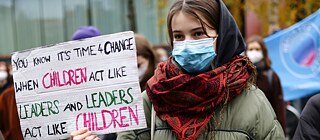Generation Z
Nothing is more important than family

“Generation Greta” is politically active, digital, liberal – but surprisingly conservative when it comes to personal life planning. We take a look at the surveys of Germans aged between ten and twenty from 2019 to 2021.
By Petra Schönhöfer
It’s one of those weekend seminars somewhere in the middle of nowhere: tenth grade students at a secondary school in a small German town are sitting at long tables. They have just been asked how they envisage their lives in ten years’ time. “I’ll be studying information technology,” says sixteen-year-old Fabian. “I’m going to be an author,” states Lisa. Apart from that, they all see themselves being in a permanent relationship (“engaged or married”) and living with pets in their own home. Children of their own are “planned” or already “on the way”. Bear in mind that we’re talking about people in their mid-twenties. To someone in their mid-40s, from Generation X in other words, that sounds surprisingly well-organised, in fact even a bit sanctimonious.
Just like their grandparents
And yet, if we are to believe the numerous studies and surveys, it is precisely these traditional ideals that characterise Generation Z – the post-millennials born between 1997 and 2010. As shown in the 18th Shell Youth Study, the values most important to the overwhelming majority of young people are good friends, a trusting relationship, and a good family life. Overall they have adopted many of their grandparents’ values, for example with regard to family and childcare: she works part-time, he makes minimal sacrifices in his job.
Talking of jobs – whilst career is an important part of life, it isn’t the top work aspiration for Generation Z. This was the opinion of around one-third of those questioned in the 2021 study future of work – which was conducted by Zenjob, an online platform for flexible side jobs. According to the study findings, a job’s compatibility with private life tops the hierarchy of needs (69 per cent). Personal identification with the company comes a close second (55 per cent), with medium-sized companies a clear favourite for Generation Z on the basis that the combination of security and familiar surroundings appears particularly attractive. Working for start-ups or self-employment are ideal work formats for around one-quarter of young people.
Smartphones from birth
Generation Z is also the first generation to have grown up with smartphones from day one. They are always online, their real life almost merges together with their digital one. They use their phone to spend a large amount of time on social networks like Instagram, a little over two hours a day according to a study by online subscription service Readly. Thanks to the internet and constant networking with the outside world, members of Generation Z are well-informed and always up to date.

Political, vibrant, committed to a cause
Diversity, inclusion and individuality play a key role for Generation Z. The vast majority of teens and young adults have a positive attitude towards the diverse social groups. Hostility is an issue for fewer than 20 per cent, according to the Shell Youth Study. It has the subtitle “A generation speaks up”, because the study also highlights that under-20s are becoming more political again. They are articulating their interests and demands amongst each other, but also in the political arena – with many campaigning for voting rights from birth as well.
Yet, the majority of young people view the future positively. Their satisfaction with democracy is rising and most of them rate the European Union positively. However, it is destruction of the environment that worries them the most. It’s not without reason that they are known as “Generation Greta” after Swedish environmental activist Greta Thunberg, who created a global youth movement with her “Fridays for Future” demonstrations.